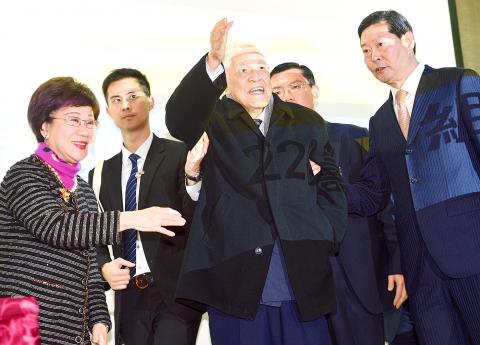A major coalition to campaign for a Taiwanese independence referendum was formed yesterday in what was the highest-level gathering of pro-independence advocates since the Democratic Progressive Party (DPP) administration took office, with former president Lee Teng-hui (李登輝) calling for a new constitution and name for the nation.
The Formosa Alliance (喜樂島聯盟), launched by Formosa TV chairman Kuo Bei-hung (郭倍宏), was joined by Lee, former president Chen Shui-bian (陳水扁), former vice president Annette Lu (呂秀蓮) and former presidential adviser Peng Ming-min (彭明敏), as well as the New Power Party, the Taiwan Solidarity Union, the Social Democratic Party and the Taiwan Radical Wings.
At a news conference in Taipei packed with hundreds of independence supporters, alliance representatives announced plans to formally launch on April 7, the anniversary of late democracy activist Deng Nan-jung’s (鄭南榕) self-immolation in 1989.

Photo: Peter Lo, Taipei Times
It said it would campaign for one year for a referendum, which it wants to hold on April 6 next year.
Taiwan’s sovereignty and political legitimacy come from the authorization of its 23 million people via direct elections and have nothing to do with China, Lee said.
“Although the relationship between Taiwan and China is in a very special state, it is undoubtedly a state-to-state relationship,” Lee said.
This special state is due to a misguided national identity shaped by the Chinese Nationalist Party (KMT) within the Republic of China (ROC) framework, he said, adding that it would require name rectification and a new constitution to formalize Taiwan’s statehood.
Lee said he had proposed the “ROC in Taiwan” framework and completed a series of constitutional amendments during his terms as president as a pragmatic approach to rebuild national identity and make progress on the goal of name rectification and promulgating a new constitution.
“With the Sunflower movement [in 2014] and the KMT’s defeats in 2014 and 2016, I think it is time to take action,” Lee said.
Taiwanese must vote in a democratic referendum to decide Taiwan’s future and make the nation a member of the UN under the name “Taiwan,” he added.
The alliance asked the DPP government to again revise the Referendum Act (公民投票法) to allow the referendum.
The latest amendment, which went into effect on Jan. 3, barred referendums on constitutional changes that would involve redefining the nation’s territory or changing its official title.
“President Tsai Ing-wen (蔡英文) has influenced many DPP lawmakers to ensure that she and the 113 legislators have a tight grip on the right to decide Taiwan’s future and the nation’s destiny,” the alliance said in a statement. “The alliance believes that [Tsai’s] methods are no different than the belief held by some Chinese that they have the right to decide Taiwan’s future and it also constitutes the severest infringement on 23.5 million Taiwanese’s right to self-determination.”

Tropical Storm Gaemi strengthened into a typhoon at 2pm yesterday, and could make landfall in Yilan County tomorrow, the Central Weather Administration (CWA) said yesterday. The agency was scheduled to issue a sea warning at 11:30pm yesterday, and could issue a land warning later today. Gaemi was moving north-northwest at 4kph, carrying maximum sustained winds near its center of up to 118.8kph and gusts of 154.8kph. The circumference is forecast to reach eastern Taiwan tomorrow morning, with the center making landfall in Yilan County later that night before departing from the north coast, CWA weather forecaster Kuan Shin-ping (官欣平) said yesterday. Uncertainty remains and

SEA WARNING LIKELY: The storm, named Gaemi, could become a moderate typhoon on Wednesday or Thursday, with the Taipei City Government preparing for flooding A tropical depression east of the Philippines developed into a tropical storm named Gaemi at 2pm yesterday, and was moving toward eastern Taiwan, the Central Weather Administration (CWA) said. Gaemi could begin to affect Taiwan proper on Tuesday, lasting until Friday, and could develop into a moderate typhoon on Wednesday or Thursday, it said. A sea warning for Gaemi could be issued as early as Tuesday morning, it added. Gaemi, the third tropical storm in the Pacific Ocean this typhoon season, is projected to begin moving northwest today, and be closest to Taiwan on Wednesday or Thursday, the agency said. Today, there would likely

DISRUPTIONS: The high-speed rail is to operate as normal, while several airlines either canceled flights or announced early departures or late arrivals Schools and offices in 15 cities and counties are to be closed today due to Typhoon Gaemi, local governments announced last night. The 15 are: Taipei, New Taipei City, Taoyuan, Tainan, Keelung, Hsinchu and Kaohsiung, as well as Yilan, Hualien, Hsinchu, Miaoli, Chiayi, Pingtung, Penghu and Lienchiang counties. People should brace for torrential rainfall brought by the storm, with its center forecast to make landfall on the east coast between tonight and tomorrow morning, the Central Weather Administration (CWA) said. The agency issued a sea warning for the typhoon at 11:30pm on Monday, followed by a land warning at 11:30am yesterday. As of

CASUALTY: A 70-year-old woman was killed by a falling tree in Kaohsiung as the premier warned all government agencies to remain on high alert for the next 24 hours Schools and offices nationwide are to be closed for a second day today as Typhoon Gaemi crosses over the nation, bringing torrential rain and whipping winds. Gaemi was forecast to make landfall late last night. From Tuesday night, its outer band brought substantial rainfall and strong winds to the nation. As of 6:15pm last night, the typhoon’s center was 20km southeast of Hualien County, Central Weather Administration (CWA) data showed. It was moving at 19kph and had a radius of 250km. As of 3pm yesterday, one woman had died, while 58 people were injured, the Central Emergency Operation Center said. The 70-year-old